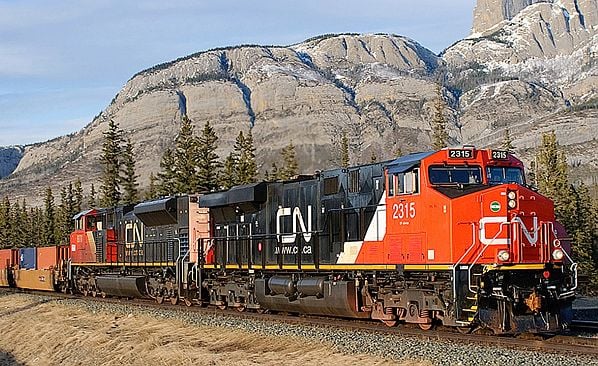CN’s operating ratio improved 380 basis points to 65.7%. While revenue remained flat at $C 3.55bn, CN managed to reduce operating expenses by 5% to $C 2.23bn, mainly due to lower staff, fuel and depreciation costs.
An increase in petroleum crude oil and grain traffic was offset by lower volumes across all other commodities mostly due to the impact of the illegal blockades of parts of the network in February and the Covid-19 pandemic in late March. As a result, revenue tonne-km fell by 1% compared with the first quarter of 2019. However, freight revenue per tonne-km increased by 2% mainly due to the inclusion of TransX within CN’s domestic intermodal services and freight rate increases.
CN has revised its financial outlook for 2020 in the light of the coronavirus pandemic, which it says is having an unprecedented and extraordinary impact on the economy. “The economic outlook and therefore overall demand for transportation services are highly correlated with the duration of containment measures and the impacts on businesses and consumers, which at this point remain uncertain,” CN says. “As a result, CN is withdrawing its 2020 financial guidance and three-year targets provided at the 2019 Investor Day.
“CN has a solid track record of resiliency in periods of economic weakness. Our strong investment grade credit rating, top-tier among all companies and the best in the rail industry, has once again proven its strategic value, providing CN with robust low-cost liquidity. CN will continue to pause share repurchases in these economic circumstances and will reassess on an ongoing basis. While it is clear that no one can predict the ultimate impact of the current global economic environment, based on what we know today, we are still working to generate a minimum of approximately $C 2.5bn of free cash flow. We are committed to maintaining our previously announced 2020 dividend increase of 7%.”

“CN’s team of dedicated railroaders has demonstrated our ability to overcome difficult situations and keep the economy moving,” says CN’s president and CEO Mr J J Ruest. “I am very proud of how we recovered quickly in March from the service disruptions in February. Our network is very fluid, and we are continuing the temporary right-sizing of our resources to match the weaker demand caused by the global recession. We are committed to providing long-term shareholder value by delivering on our strategic capacity investments for growth and by deploying technological innovations.
“CN’s 2020 key assumptions are withdrawn and can no longer be relied upon given the high degree of business uncertainty caused by the Covid-19 pandemic, its severity, magnitude and duration, including impacts of the pandemic and of businesses’ and governments’ responses to the pandemic on our business, financial position, results of operations and liquidity. In 2020, CN now plans to invest approximately $C 2.9bn, of which $C 1.6bn is still targeted towards track and railway infrastructure maintenance.
“Our investors know we manage the business to deliver long-term performance, and we continue to build for 2021 and beyond. We will balance the need to manage through the short-term with the focus on long-term performance of the business. The network is currently in full operation and very fluid.
“We have the capacity to move goods and enable the eventual recovery of the economy. We also continue to build on our technology such as automating track and train inspection, and fully enabling connected and paperless train crews and increasing train automation.
“Our financial strength will also service well in the near to long-term. We have a very robust balance sheet and a proven track record of dealing with any type of business disruption. Our 2020 capex will further enhance capacity in the strategic and maintain the Prince Rupert growth corridor, as well as the infrastructure required for our growth in and around the Port of Vancouver,” Ruest concludes.

